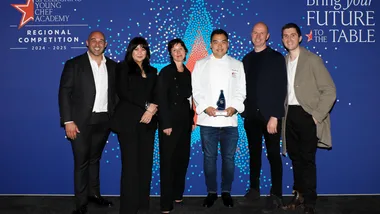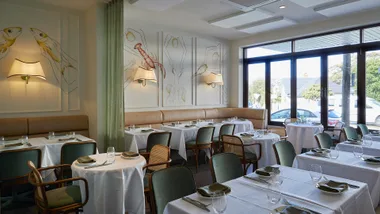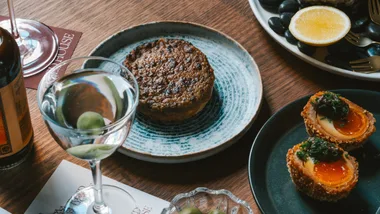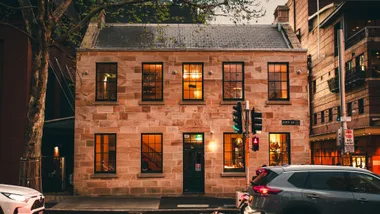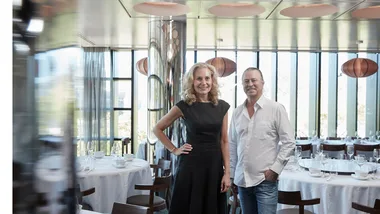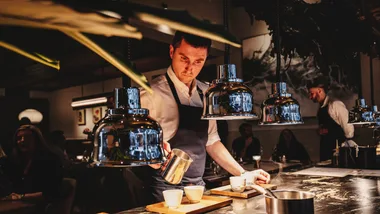Will Studd finds a thriving artisan cheesemaking scene in the US, hitherto not known for its cheese culture.
Little more than a decade ago the idea that the United States could make a cheese that would proudly sit alongside the great benchmarks of Europe would have seemed risible. American cheese had a serious image problem and was considered to be a symbol of industrial evil in specialist-cheese circles. But in recent years there has been an astonishing change in how the international community perceives US artisan cheese. The catalyst for this change was a cheese from Oregon’s Rogue Creamery being named best blue cheese in the world in London in 2003. After some years of diplomatic negotiations, Randolph Hodgson of Neal’s Yard Dairy was able to import this raw-milk cheese to the UK. It sold out in weeks.
Today, Vermont is home to about 70 artisan cheesemakers, more per capita than any other US state. One of the most inspiring is Jasper Hill in Vermont. Established in 2002 by brothers Andy and Mateo Kehler, it ticks all the boxes, producing interesting farmstead cheese with a genuine sense of place.
When I first visited, it was a small struggling family enterprise, but it had well-researched plans and an ambitious vision to make exceptional blue and surface-ripened cheese with raw milk collected from the farm’s herd of 45 Ayrshire cows. To meet Food and Drug Administration regulations, these cheeses had to be aged for at least 60 days before sale. In a small maturation room built under the dairy I came across a rack of grey mouldy clothbound cheese maturing in a dark corner. To my surprise I was told they were an experiment made by the nearby Cabot cooperative, which is well known in the US for its industrial vacuum-sealed cheddar.
Ageing this kind of cheese seemed at odds with the ethos of a farmstead dairy, but this cheddar was clearly different. For a start the curd had been drained and formed in old-fashioned round hoops rather than blocks, and instead of using cooperative milk from dozens of properties, the cheese had been produced from the yield of a single farm. The young wheels had then been transported from Cabot dairy to Jasper Hill where they were larded and bound with cheesecloth to seal the surface and prevent it from drying out during ageing.
It was a novel idea, but it worked. Big time.
The unique caramel-sweet flavour of the moist, crumbly cheddar was a triumph. It combined the time-honoured skill of carefully maturing clothbound cheddar with modern cheesemaking techniques using selected starter-cultures. The Cabot Clothbound Cheddar I tried that day marked the beginning of an extraordinary partnership between an industrial cooperative and a small farmstead dairy that would ultimately redefine the cheesemaking reputation of the state of Vermont.
When I returned to the dairy a few months ago I was amazed to see the changes first-hand. Mateo acknowledged that the Cabot cooperative was “the donkey that does the heavy lifting” and their generous philosophy that “a rising tide lifts all ships” had been a catalyst for the development of a thriving local artisan cheese scene. Most significantly, the success of the clothbound cheddar had enabled the Kehler brothers to build one of the world’s most impressive cheese maturation facilities and to realise their goal of providing tangible economic benefits to the agricultural community.
The brothers have plans to expand production to new purpose-built farm dairies using proven cheese recipes developed at The Vermont Food Venture Center in nearby Hardwick. At this shared facility, Jasper Hill currently produces its soft and creamy spruce-bound Jasper Hill Harbison from pasteurised local milk and a delicious new hard-cooked cheese called Alpha Tolman. These are both then transported to Jasper Hill’s cellars as young cheeses to be expertly ripened before sale.
The production of raw-milk cheese still lies at the heart and soul of Jasper Hill’s philosophy and an impending FDA review of the 60-day ageing rule is an ongoing concern, particularly for the dairy’s wonderful spruce-bound seasonal cheese, Winnimere, and its flagship Bayley Hazen Blue. But despite these threats the Kehlers agree that their operation is past the fight-or-flight mode. “We’re just getting started now,” they told me, “and so many things are possible.”
Take a behind-the-scenes tour of Jasper Hill with Will Studd in the video clip below.
